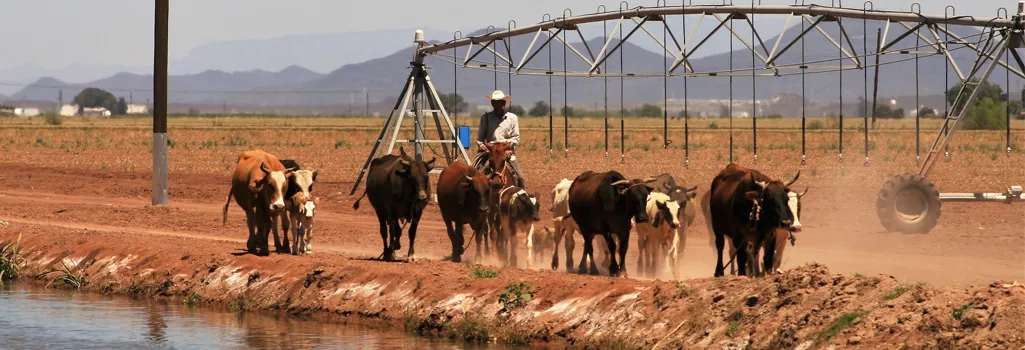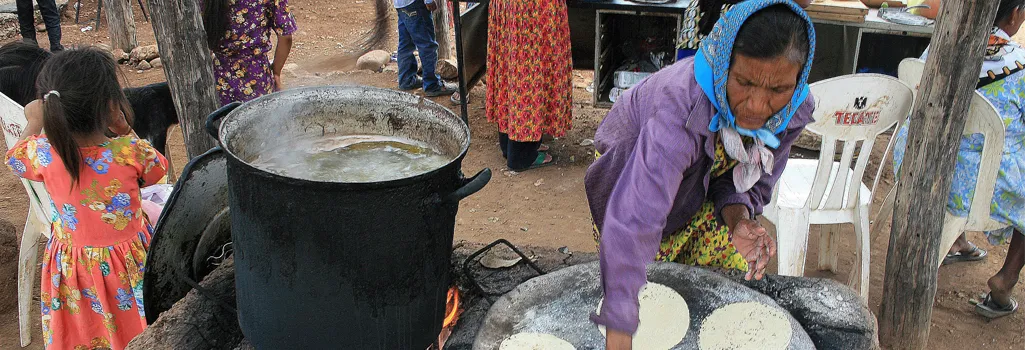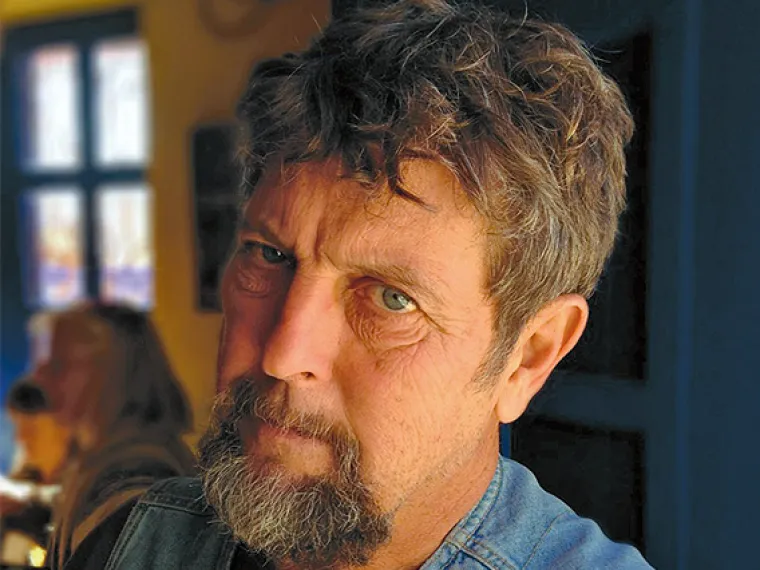Mission & Research
A major focus of researchers at the Southwest Center is the relationship between rural peoples and the environments that provide us with agricultural and water resources. We draw from Community-Based Conservation and Biocultural Restoration approaches to help rebuild the networks that support food sovereignty. Our research and outreach support initiatives to overcome disparities in food and water access, including the structural racism that leads to them. Much of this work aims to foster effective cross-cultural dialogue, building broad coalitions to provide technical and other means of support for food-producing peoples and places. We support community rights to food justice, arable land and safe water, to livable wages, and the pursuit of land-based livelihoods. We work to improve human health and nutrition, as well as to foster inclusive community well-being.
Southwest Center research staff and graduate students have played pivotal roles in Tucson's designation by UNESCO as the first City of Food Cultures in the United States, and in the establishment of the Santa Cruz Valley National Heritage Area. We are also currently involved in transborder collaborations to monitor the impacts of border policies and wall construction on sacred sites, ceremonial grounds, wildlife habitats, food waste and water flows.
Partnerships
Arizona-Sonora Desert Museum
Center for Regional Food Studies
David Seibert
Greg Orfalea
National Cowboy Poetry Gathering
Native Seeds SEARCH
Quvira Coalition
Santa Cruz Valley Natural Heritage Area
Slow Food USA
Suzanne Nelson, Ph.D.
Western Folklife Center
Tucson City of Gastronomy Jonathan Mabry
Alberto Mellado-Moreno
Denisse Ortega
Agave Heritage Festival
Francesca Claverie

Photo by David Burckhalter
Projects
Mesquite, a Training Manual for Growers, Harvesters & Artisans
Mesquite is the most abundant forestry resource in most of the poorest counties and municipios in the Desert Borderland. And yet, if it properly managed, mesquite can offer quality hardwoods for furniture and musical instruments, pods for foods, beverages and anti-diabetic medicinals, smoke for grilling rubs and chips, as well as honey, mead, and propolis to support rural families. In addition, mesquite can be pruned and thinned to enhance wildlife habitat and livestock pasture, and reduce wildfire risk.
This manual is intended to train underemployed or unemployed desert dwellers so that they can gain satisfying livelihoods and liveable wages in a restorative rather than an extractive economy. It was developed by the University of Arizona Southwest Center in collaboration with the Borderlands Restoration Network, Regeneration International, Mission Gardens, and master artisans to develop mesquite artisan training centers along both sides of the border. It was supported by the University's AIRS programs in 2022
Read/Download the book HERE
You can also watch Gerardo Ruiz Smith's lecture Mesquite and Permaculture in Food Systems on our YOUTUBE CHANNEL
Sabores Sin Fronteras/Flavors Without Borders
A farming, ranching and foodways alliance that documents, celebrates and promotes the shared agricultural and culinary traditions of the U.S.-Mexican border states. This research collaboration hosts symposia, festivals, agri-cultural tours, publications and field studies.
Saving the Wide Open Spaces
An applied research collaboration and public forum regarding the causes and trends in the fragmentation of working landscapes in the American West, and means to avert further agricultural, ecological, cultural and economic losses (with Tom Sheridan, David Seibert, Baron Orr and others). Its initial event occurred at White Horse Ranch in Marana, Arizona, in 2007, and an edited volume has been published as Stitching the West Together Again (Chicago, 2014). Nabhan also collaborates with Quivira Coalition, Western Folklife Center and sustainable ranching advocates such as Dennis Maroney, Mandy Metzger, Mike Stevens, Ivan Aguirre, and Duncan Blair on particular workshops held in the state, at the National Cowboy Poetry Gathering, and elsewhere.
Renewing America’s Food Traditions
An alliance of food, farming, conservation, and culinary advocates, RAFT‘s mission is to “identify, restore and celebrate America’s biologically and culturally diverse food traditions.“ Founded by Nabhan in 2005, RAFT partners include, among others, Slow Food USA, Chefs Collaborative, American Livestock Breeds Conservancy, Native Seeds/SEARCH (including graduate student Kanin Routson and adjunct professor Dr. Suzanne Nelson). Its work involves conservation, restoration, education, promotion of sustainable production, and regional networking. It co-sponsors participatory workshops to assemble the first-ever list of foods unique to North America which are at risk of falling out of the American food system, recover of particular foods in collaboration with their communities of stewards, and sponsor America Traditions Picnics. The RAFT database of place-based foods at risk by foodshed is being used to test whether geographic patterns of endangerment for domesticated food varieties in North America is similar to or different from that for endangered wild species, and why. RAFT encourages all individuals and organizations to become allies to the original stewards of both wild and domesticated foods who are seeking to achieve their food sovereignty. The book from Chelsea Green Press, Renewing America’s Food Traditions (2008), is the most comprehensive expression of the RAFT work to date.
Southwest Regis-Tree
This documentation and conservation effort is focused on the in situ conservation of perennial fruits, nuts and succulent populations in the border states in the Southwest. Since founded by Nabhan and Kevin Dahl in 1994, it has documented over 100 sites of abandoned homestead orchards, hedgerows, historic farms, ranches and prehistoric terraces that still harbor plant materials of historic and horticultural significance. Recent work has included graduate student Kanin Routson’s survey and identification of heirloom apples of the Southwest. We have also had a strong collaboration with Native Seeds/SEARCH, the Kino Fruit Project (spearheaded by Jesus Garcia of the Arizona-Sonora Desert Museum), and the National Pak Service. Nabhan was a keynotespeaker at the National Park Service conference, “National Parks, Partners and Heritage Products,” in autumn of 2008 at Cuyahoga Valley National Park, and Western National Parks Association will publish his booklet on Heritage Farming the same season.
Trading Spices
Arabic and Sephardic Jewish influences on crop geography and cuisines from the American Southwest and northern Mexico to China. This historical geographic research project focuses on the role spice trade carried out by Moslem and Christian Arabs and Sephardic Jews has had upon globalized patterns of distribution of certain foodstuffs, crops and culinary preparations. In particular, it seeks to elucidate the presence of Moslem and Jewish conversos in the U.S. Southwest and Northern Mexico following the Spanish Inquisition and expulsion of these groups from the Iberian Peninsula. The diffusion hypothesis to be tested is whether their culturally-specific recipes, terms and techniques arrived in border states, not merely their crops. This project has elements that involve former UArizona graduate student Rafael Routson and University of Arizona Press author-historian Greg Orfalea.

Photo by David Burckhalter



